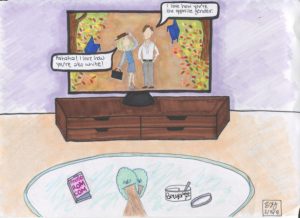By Emerald Green

John Hughes tricked the people of the 80s into dreaming that the hot upperclassman would see that dorky nerd and fall in love on the steps of a church, as Andie does in “Pretty in Pink” (1986), or in the seats of detention, like John Bender in “The Breakfast Club” (1985). The 90s were centered around Gary Marshall’s playfully controversial films such as “Pretty Woman,” “Runaway Bride,” and “Never Been Kissed.” However, romantic comedies truly peaked during the early 2000s with “How to Lose a Guy in Ten Days” and “13 Going on 30,” but they manipulated generation after generation into believing that, someday, everyone will find their true love, and it will be a cute, funny story to tell.
No love story is the same, but all rom-coms start the same way. Pretty woman meets man. Their story takes place in Manhattan, obviously, and when she least expects it– probably during a really critical point in her career or when she has given up and sworn off love or the opposite sex for the foreseeable future. He, of course, is a womanizer and has serious commitment issues because of an ex-girlfriend and a doting mother while his father was distant and cold.
The two tango with an undeniable connection and attraction, but they DO deny it. Their friends can clearly see that they are meant to be, but they don’t. She is absolutely clueless when it comes to crazy, stupid love, and he runs from it. When they finally realize that they really, truly love each other, the movie ends with a big kiss and an ambiguously upbeat pop song that leaves audiences assuming that the two get married (because heterosexual relationships have always been legal), have two and a half kids, and move to the suburbs where Jake will not cheat on his wife. The reality is that more people are probably familiar with the “(500) Days of Summer” version of love: the one where the person that was “the one” doesn’t say “I love you” back and thinks it would be better to just be friends.
Most rom-coms aren’t based on true stories, but they are constantly referenced in pop culture as the epitome of love even though they never happened. They only reflect a small fraction of the stories that actually occur in the real world. Interracial couples are not an option, and any gay characters exist only for comedic effect: the eccentric best friend in the background that’s great for advice and sarcastic comments. Her name is something like “Stef,” and she is usually, wiser, chubbier, and a hippie. She doesn’t seem to deserve to have her own love story despite her obvious moral superiority and actual personality, but her skinny pal Sandy does.
Almost all of these roles are played by white actors. “Hitch,” starring Will Smith, an African-American, and Eva Mendes, a Latina, was one example of leading people of color in a romantic comedy to gross the amount of money and popularity that it did in 2005. Everyone loves Will Smith, but there are other actors of color that can play the roles in fantastic love films just as well as the “Fresh Prince” did. Jennifer Lopez is the most famous Latina of Puerto Rican descent, but in “The Wedding Planner,” she was Italian. Matthew McConaughey is so tired of playing every white male lead in a romantic comedy that he had to go to outer space with Christopher Nolan to escape any more castings: “Interstellar” (2014).
Even when movies pretend that they are not in this genre, they are. In “He’s Just Not That Into You,” (a movie that includes too much Bradley Cooper and not enough Drew Barrymore) Gigi’s (Ginnifer Goodwin) love is finally requited only seconds before the credits as Justin Long’s Alex admits that she is “his exception.” His exception? What is that supposed to mean? That line follows the general theme of rom-coms where at a certain point in the movie, he says something to the effect of “You’re not like other girls.” Is that supposed to be a compliment? Apparently. It’s also supposed to be incredibly charming because an almost-decently attractive actor says it. Everyone is different, but as Hailee Steinfeld said, “most girls are smart, strong, and beautiful.” Contradicting that in the form of a “compliment” is disrespectful to an entire gender.
Such movies teach young girls that they will ultimately need a man to be happy and complete their lives, and that guys are not allowed to fall in love because “the boys” would lose a “fallen soldier.” At least, girls know that they can balance him with a career in the big city and not be shackled to a cult of domesticity. This princess can save herself and create a spreadsheet in an orderly and timely manner.
The ugly truth is that love is clumsy but in fact, a necessity. Everyone needs a little love in their hearts. It is what connects every person to another. It makes people do things that they wouldn’t usually do in order to to let that special someone know that they are “the one.” Sometimes it includes big romantic gestures, and sometimes it doesn’t. Life isn’t a romantic comedy, but that’s okay because love, actually, is all around.











